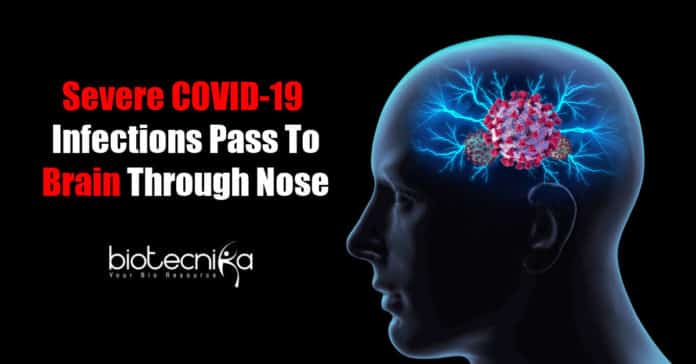COVID-19 infects brain cells in severe cases
German researchers have claimed that patients infected with very severe SARS-CoV-2 infection can pass the SARS-CoV-2 virus to their brains through noses.
This happens via infection in nasal mucus accompanied by the following attacking the olfactory nerve. The team concluded that the coronavirus could invade the nervous system by crossing the neural-mucosal interface during an infection.
This is the first recorded proof of COVID-19 transmission to the brain via the mucosal pathway.
The study results in the journal Nature Neuroscience were ascertained via autopsies performed on 33 patients who had died due to COVID-19.
COVID-19 causes breathing problems and neurological issues like headache, fatigue, loss of focus, confusion, and brain fog, along with nausea, anosmia, or loss of smell.
German researchers from Charité – Universitätsmediz, Berlin, carried out autopsies to know the trigger for these neurological symptoms, which are caused by the brain or nervous system getting affected. They examined the mucous at the back of patients’ noses, the area where the nasal cavity and the throat meet (where nasopharyngeal swabs are taken for RT-PCR tests).
The scientists also examined samples of brain tissues drawn from dead people.
The group observed the presence of viral RNA material in high concentrations in the mucous of the nasal cavity using an electron microscopy image of undamaged coronavirus fragments within the mucus as well. Yet, the presence of the coronavirus spike protein was found in the brain.
Coronavirus detected in walls of brain blood vessels
Additionally, the team observed coronavirus spike protein in a particular cell type within the olfactory mucous layer, where it has the capability to pass through the endothelial and nervous tissue, ultimately into the brain.
Additionally, in some people, the spike protein was detected in neuron marker cells, signifying that olfactory sensory neurons may be infected, in the wall of brain blood vessels, and in portions of the brain that receive the signals of smell and taste.
Moreover, the scientists detected the SARS-CoV-2 fragments in various other areas of the nervous system, like the medulla oblongata.
Results may vary in mildly infected cases
Virus passing the blood-brain barrier and other types of nervous system protections to enter the brain is not surprising, as rabies and influenza viruses have developed pathways to impact the brain, leading to conditions like encephalitis or swelling of the brain.
The researchers stressed that the individuals they executed post-mortems had a very severe instance of the COVID-19 and died on an average 30 days from the infection.
The average age of the dead individuals in the research was 71 years. Hence, they accentuated that it is not possible to use their study outcomes to mild or moderate infections.
COVID-19 infects brain cells in severe cases






